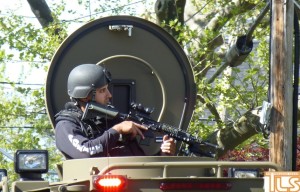 Assembly Homeland Security and State Preparedness Chair Annette Quijano (D-Union) on Wednesday warned about the dangers of “swatting” and urged parents to talk to their children about the issue after a string of recent hoax incidents in New Jersey drew large-scale law enforcement responses.
Assembly Homeland Security and State Preparedness Chair Annette Quijano (D-Union) on Wednesday warned about the dangers of “swatting” and urged parents to talk to their children about the issue after a string of recent hoax incidents in New Jersey drew large-scale law enforcement responses.
The FBI describes “swatting” as making a hoax call to 9-1-1 to draw a response from law enforcement, usually a SWAT team. The individuals who engage in this activity, many of whom are teens and twentysomethings with ties to the online gaming community, use technology to make it appear that the emergency call is coming from the victim’s phone. The FBI notes that sometimes swatting is done for revenge, sometimes as a prank, but either way, it is a serious crime that has potentially dangerous consequences.
Quijano cited recent swatting incidents in New Jersey – including a gaming shop in Clifton, a home in Upper Freehold and an elementary School in Homdel – as the need for greater attention from everyone to help prevent more dangerous hoaxes.
“It’s important for parents to know what their kids are up to and talk to them about the dangers of swatting. In this day and age, I know it’s not always easy to stay on top of what your kids are doing every minute of the day, especially with technology. That’s why it’s important that parents at least create a dialogue about how dangerous swatting is so kids realize it’s not just an innocent prank. It endangers people’s lives and wastes taxpayers’ money.
“Authorities estimate that the dangerous hoax costs New Jersey law enforcement agencies tens of thousands of dollars every year while diverting resources from other real crimes and putting innocent residents in the crossfire. There have even been reports of people having heart attacks because they were caught off guard when armed SWAT teams showed up at their doors unexpectedly. This demands a concerted effort to draw greater attention to the issue and underscore the severity of it,” said Quijano.
As Chair of the Assembly Homeland Security and State Preparedness Committee, Quijano hopes to have a hearing in the near future on a bill currently pending in the legislature that would stiffen the penalties for creating a false alarm.
Quijano also noted that the FBI recommends making a police report if anyone receives a swatting threat online. Such threats typically come from the online gaming community, where competitors can play and interact anonymously. With a report on file, if a 9-1-1 incident does occur at someone’s home, the police will be aware that it could be a hoax.
[TLS]

why doesnt LE first send a patrol car to drive by and only if he sees something suspicious call in for backup
#1 Because that might preclude them from playing Navy SEAL dress-up and riding around in surplus armored personnel carriers.
if you were an administrator for LE and made that call I would transfer to another department.
#2 #1 imagine what would happen if they sent a single patrol car by and a swat team was really needed, and the end result is a major tragedy. You would be screaming about their stupidity.